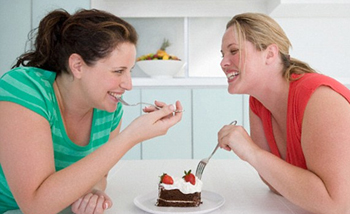Washington, Oct 4: The body type of your dining partner, or that of those eating nearby, may influence how much you serve yourself and how much you eat, according to a new study.

The finding support a theory that when eating with or near an overweight person, you may be less likely to adhere to your own health goals.
"This finding emphasises the importance of pre-committing to meal choices before entering the restaurant," said lead author Mitsuru Shimizu, Assistant Professor of Psychology at Southern Illinois University, Edwardsville who conducted the study with Brian Wansink, PhD director of Cornell University's Food and Brand Lab.
"If you go into the restaurant knowing what you will order you're less likely to be negatively influenced by all of the things that nudge you to eat more," Shimizu said.
The researchers recruited 82 undergraduate college students to eat a spaghetti and salad lunch. They also enlisted an actress to wear a prosthesis that added 50 pounds to her normally average weight.
Each of the 82 participants was randomly assigned to one of four scenarios.
The actress served herself healthfully (more salad and less pasta) while wearing the prosthesis, she served herself the same healthy meal without the prosthesis, she served herself less healthfully (more pasta and less salad) while wearing the prosthesis, or she served herself the same less healthy meal without the prosthesis.
Participants in each scenario viewed the actress serving herself and then served themselves pasta and salad.
Researchers found that when the actress wore the prosthesis, and appeared overweight, the other participants served and ate 31.6 per cent more pasta regardless of whether she served herself mostly pasta or mostly salad.
When she wore the prosthesis and served herself more salad, the other participants served and ate 43.5 per cent less salad.
These findings demonstrate that people may serve and eat larger portions of unhealthy foods and smaller portions of healthy foods when eating with an overweight person because they are less in tune with their own health goals.
The study was published in the journal Appetite.





Comments
Add new comment